Does vanilla extract repel mosquitoes? Our entomologists explore the benefits and drawbacks of this all-natural alternative
It's more effective when combined with other methods


Spending time outdoors, be it on your deck, patio or whilst busy gardening is a joy but one snag remains an irritation – mosquitoes. And, they can end up bothering you both outside and inside as early as February in some regions.
With nasty, itchy bites, mosquitoes emerge in spring and peak during summer, drawn out by the increasing temperature. While repellents are an effective way to keep bugs and bites at bay, the majority contain a whole host of harsh chemicals, leaving many hoping for a more natural alternative that works.
Vanilla extract is often touted as a great way to get rid of mosquitoes, and the good news is, it actually works. Here, entomologists share their expertise.
Does vanilla extract repel mosquitoes?
When it comes to scents that deter mosquitoes, vanilla extract can be used as a natural pest control method. The theory behind its success is that much like other potent plant derivatives, the strong smell of vanilla covers the scent of humans, eliminating the attraction for mosquitoes.
Shannon Harlow-Ellis, associate certified entomologist at Mosquito Joe, explains, 'Vanilla extract (such as Great Value Pure Vanilla Extract available at Walmart) will mask the odor mosquitoes are searching for when looking for a blood meal. It has a natural appealing scent,' which is far less offensive than other, deet-based repellents such as Repel 100 Insect Repellent available at Amazon, which provides 10-hour protection, but is 98% deet. It can also help extend the efficacy of other DIY repellents.
Kyle Sebach, director of operations at All U Need Pest Control, adds, 'Like citronella, vanilla extract portrays a very strong smell that mosquitoes typically do not like.'
The drawbacks of this method
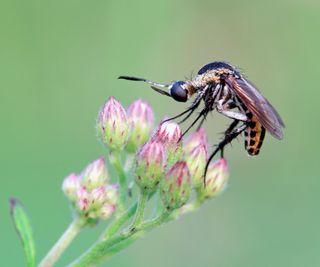
So, while vanilla extract can be used as a natural way to repel mosquitoes, it's not a flawless solution. For starters, says entomologist Shannon, it's expensive.
'It must be pure vanilla extract,' she advises, such as Watkins Pure Vanilla Extract available at Amazon. 'Vanilla with other additives (which is usually cheaper) can attract insects with the sugary smell,' resulting in an entirely adverse effect. You will also need to use a considerable amount.
The scent of vanilla is also not ever-lasting, with entomologist Shannon saying it will only last between 30 and 45 minutes when used alone. But, this can be extended when combined with other repellent scents, like a citronella candle, such as the Mosquito Repellent Candle available at Amazon.
Additionally, vanilla extract won't work to tame infestations when trying to get rid of mosquitoes in the kitchen, for example. Dr. Jim Fredericks, board certified entomologist and senior vice president of public affairs at the National Pest Management Association (NPMA), warns, 'We do not recommend trying any DIY treatment methods for pest infestations, as they typically do not provide a long-term solution.
'Those who suspect an infestation should call in the pros immediately. Pros are trained to identify the species of pest infesting a building and tailor their control efforts to that pest’s biology and behaviors.'
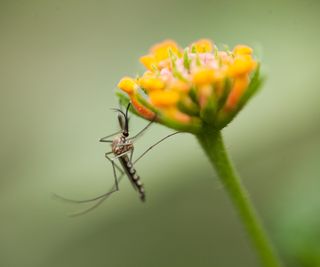
Our experts also warn that just like any repellent products, natural or not, allergic reactions are a risk.
Shannon adds, 'With any product applied to the skin, there is always a risk of reactions.' For that reason, if you do want to use vanilla extract as a repellent, test it on a small area of your skin first, or set it out in shallow dishes rather than rubbing it directly on your body.'
Alternative mosquito repellents solutions
1. Limit the amount of stagnant water in your garden
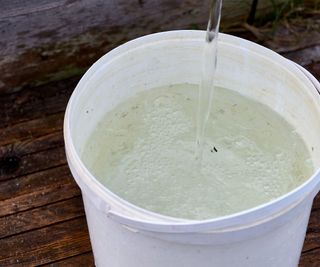
Mosquitoes are attracted to the smell of stagnant water, so reducing sources of it in and around your home will help fight numbers.
Pest expert Kyle advises, ‘Overturn buckets that have water in them, and contraptions that may hold water. This will ensure that no mosquitoes are using this water to lay in and hatch eggs,’ which will worsen the problem.
2. Use apple cider vinegar

Apple cider vinegar is an effective solution to repelling mosquitoes, particularly when mixed with peppermint oil, another scent garden pests hate, like this 100% pure one from Walmart. This will also helps to mask the acidity of the vinegar.
Entomologist Shannon directs, 'Mix two ounces of apple cider vinegar with two ounces of distilled water and 40 drops of peppermint oil in a small spray bottle and shake the mixture.
This can then be sprayed onto your skin (patch test first) or used to mist the air.
All prices correct at time of publication.

This spray bottle is ideal for misting, with an ergonomic two finger grip trigger for ultimate comfort.
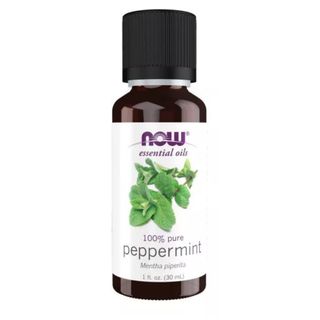
This oil is created through a natural distillation process, for an undiluted, potent, and highly-concentrated result.
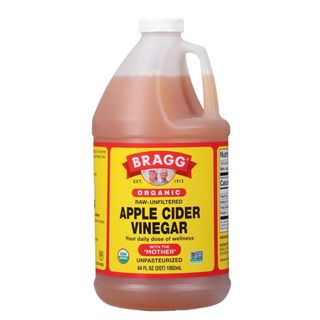
This USDA organic apple cider vinegar is unpasteurized and all natural, without additives and preservatives.
3. Light citronella candles
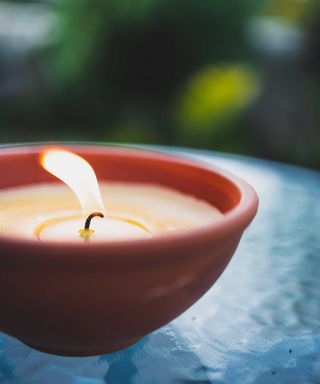
Can citronella repel mosquitoes? As well as being a relatively cheap option, citronella candles really do work.
Pest expert Kyle recommends, 'I would suggest lighting citronella candles in your outside area to reduce mosquitoes,' which can also double-up as part of your table-scaping for an al fresco candle-lit dinner.
This will also work to repel ladybugs, and, if you choose to grow citronella, it's one of the best wasp repellent plants, too. You can also use citronella in your home to keep mosquitoes away from the front door.
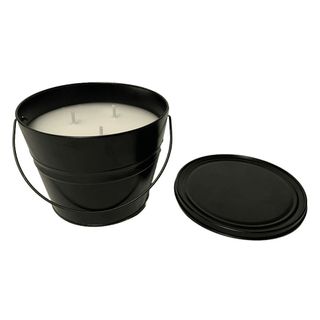
This huge candle is super affordable, made with real citronella oil. Simply pop the lid on when not in use to protect it from the elements and preserve the scent.
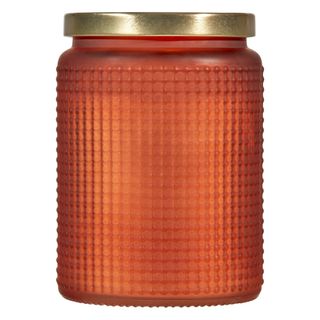
Prefer something more stylish? This candle is designed for outdoor use, with a decorative hobnail design and 18 oz capacity for extended burn time.
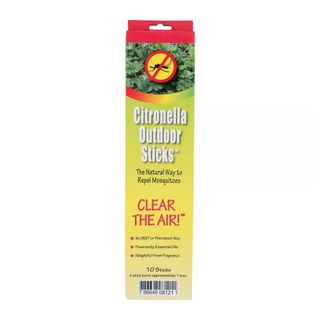
For a flameless option, these citronella sticks individually burn for approximately one hour, made with all-natural ingredients.
4. Use coconut oil
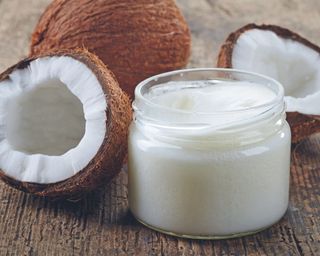
You can also use coconut oil, such as this bestselling coconut oil from Amazon, to repel mosquitoes, which entomologist Shannon particularly recommends if you have children.
‘Mix 2.5 oz of coconut oil and 15 drops of lavender or rosemary oil in a small jar (such as the Mainstays Clear Glass Airtight with Lid Storage Jar available at Walmart) and shake,’ she says. ‘This mixture is applied by hand,’ and will soften skin, too.
5. Sweep away food
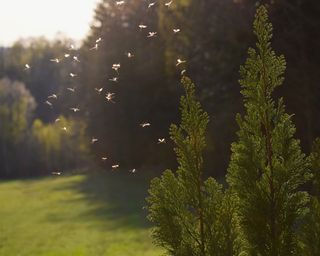
If you regularly enjoy cookouts, chances are your backyard is filled with food crumbs.
Pest expert Kyle says, ‘A lot of people have grills and other food sources that are typically in back patios where you find mosquitoes. Limiting these food particles would slightly help.’
Simply sweep away crumbs with an outdoor brush, such as the Yocada 18 Inch Push Broom available at Amazon, and pop them directly into a trash bag. If you have a trash can outdoors, ensure you empty it regularly to avoid attracting both warm weather and winter garden pests.
FAQs
What other natural smells repel mosquitoes?
Peppermint, cedar, catnip, patchouli, lemongrass and lavender are all other natural alternatives that can work to repel mosquitoes.
You can use essential oils or add these best pest-repellent plants to your flowerbeds to keep your garden smelling sweet, and mosquito-free, all summer long.
While vanilla extract can be used as an all-natural alternative to chemical-based repellents, such as traditional deet spray, it's not 100% efficient. But, it can work well when combined with other solutions.
Taking extra measures, such as lighting a citronella candle, will have your garden or home smelling sweet, and keep mosquitoes at bay, meaning you can enjoy the warmer weather without the stress of bugs and bites.
These tips can also be used in your home to keep flies out of the house, particularly if you prefer to keep your backyard doors open in summer.
Sign up to the Homes & Gardens newsletter
Design expertise in your inbox – from inspiring decorating ideas and beautiful celebrity homes to practical gardening advice and shopping round-ups.

Ottilie joined Homes & Gardens last year, after finishing a Master's in Magazine Journalism at City, University of London. With previous contributions in Livingetc and Motorsport Magazine, she produces content for the Solved section on the website, focusing on clever tips and tricks to keep your home beautiful, organized and clean. She also has an undergraduate degree in English Literature and History of Art from the University of Edinburgh, where she developed a love for inspiring interiors and architecture.
You must confirm your public display name before commenting
Please logout and then login again, you will then be prompted to enter your display name.
-
 The living room in Joanna Gaines' stunning Castle project is so effortlessly transitional – embracing the home's stunning architecture and adding in her iconic modern rustic style
The living room in Joanna Gaines' stunning Castle project is so effortlessly transitional – embracing the home's stunning architecture and adding in her iconic modern rustic styleJoanna Gaines' Castle project is a timeless example of transitional style at its best. The living room embraces tradition and features a mix of old and new decor
By Eleanor Richardson Published
-
 My easy-to-maneuver and lightweight Miele C1 vacuum is perfect if you have back or arm pain – grab 20% off in the final stretch of Amazon’s Big Spring Sale
My easy-to-maneuver and lightweight Miele C1 vacuum is perfect if you have back or arm pain – grab 20% off in the final stretch of Amazon’s Big Spring SaleEven though I love my robot vacuums, I won’t be letting go of my Miele
By Punteha van Terheyden Published
-
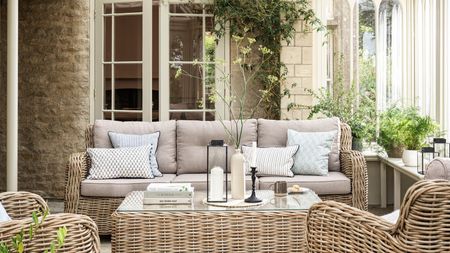 I'm a board-certified entomologist and this is the one rodent infestation control mistake I urge you to avoid at all costs – you'll regret it deeply
I'm a board-certified entomologist and this is the one rodent infestation control mistake I urge you to avoid at all costs – you'll regret it deeplyDon't put your health or home at risk
By Daniel Baldwin Published
-
 5 non-toxic mothball swaps that work – ditch chemicals and that horrible odor with these simple but effective alternatives
5 non-toxic mothball swaps that work – ditch chemicals and that horrible odor with these simple but effective alternativesThey'll protect your clothing and closets from moths without harsh chemicals
By Chiana Dickson Published
-
 5 non-toxic pest control essentials proven to prevent pests humanely – and why avoiding harsh chemicals is a must to keep your family healthy
5 non-toxic pest control essentials proven to prevent pests humanely – and why avoiding harsh chemicals is a must to keep your family healthyNatural pest repellents are more affordable, too
By Chiana Dickson Published
-
 6 ways to prevent mold and damp in bedrooms – expert solutions to maintain a safe sleep environment
6 ways to prevent mold and damp in bedrooms – expert solutions to maintain a safe sleep environmentDon't sleep on these six tips, experts urge
By Seraphina Di Mizzurati Published
-
 6 hidden places pests love to harbor their young – pest control experts reveal how to stop colony growth in your home
6 hidden places pests love to harbor their young – pest control experts reveal how to stop colony growth in your homeYou can stop pests breeding in your home
By Andy van Terheyden Published
-
 How to keep stink bugs out of the house – according to entomologists
How to keep stink bugs out of the house – according to entomologistsSeal gaps, reduce plants, and use deterrents, pest experts recommend
By Ottilie Blackhall Published
-
 How to get rid of pill bugs inside your house and banish them for good
How to get rid of pill bugs inside your house and banish them for goodThough harmless, you won't want a pill bug infestation inside, entomologists warn
By Ottilie Blackhall Published
-
 How to get rid of mice in the attic – banish these pesky invaders for good with these top tips from pest control pros
How to get rid of mice in the attic – banish these pesky invaders for good with these top tips from pest control prosFrom what draws them in to how to get them out – experts reveal everything you need to know about dealing with mice in the attic
By Andy van Terheyden Published